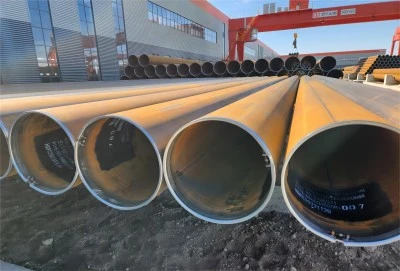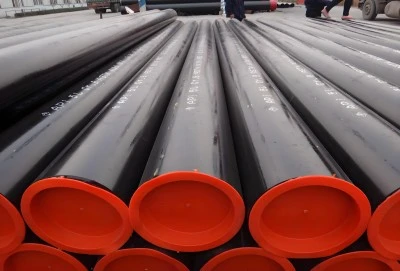Emerging Trends in API Carbon Steel Pipe Usage:
The construction industry is witnessing a paradigm shift in how API carbon steel pipes are being utilized. These robust and versatile pipes are finding new applications across various sectors, revolutionizing the way we build and construct.
One of the most notable trends is the increased use of API carbon steel pipes in sustainable construction practices. As the world moves towards more environmentally friendly building methods, these pipes are being incorporated into green building designs. Their durability and recyclability make them an excellent choice for projects aiming to reduce their carbon footprint.
Another emerging trend is the use of API carbon steel pipes in modular construction. This innovative building method involves constructing sections of a building off-site and then assembling them on-site. The strength and flexibility of API carbon steel pipes make them ideal for creating sturdy frameworks for these modular units, allowing for faster and more efficient construction processes.
In the realm of urban infrastructure, API carbon steel pipes are playing a crucial role in smart city developments. These pipes are being used in advanced water management systems, underground utility networks, and even in the construction of smart buildings. Their ability to withstand high pressure and resist corrosion makes them perfect for these complex urban applications.
The oil and gas industry, a traditional stronghold for API carbon steel pipes, is also seeing new trends emerge. With the push towards cleaner energy sources, these pipes are being adapted for use in natural gas transportation and storage facilities. Their high-pressure tolerance and resistance to extreme temperatures make them invaluable in these applications.
In the field of disaster-resistant construction, API carbon steel pipes are gaining prominence. Their inherent strength and flexibility make them ideal for buildings designed to withstand earthquakes, hurricanes, and other natural disasters. Engineers are incorporating these pipes into structural designs to create more resilient buildings and infrastructure.
Lastly, the trend of digitalization in construction is also impacting the use of API carbon steel pipes. Advanced sensors and monitoring systems are being integrated into these pipes, allowing for real-time data collection on structural integrity, pressure levels, and potential leaks. This fusion of traditional materials with cutting-edge technology is paving the way for smarter, safer construction projects.
API Carbon Steel vs Other Materials: A Comparison
When it comes to choosing materials for construction projects, API carbon steel pipes often find themselves in competition with other options. Let's compare API carbon steel pipes with some of these alternatives to understand their unique advantages.
1. API Carbon Steel vs Stainless Steel:
- Cost: API carbon steel is generally more cost-effective than stainless steel, making it a more economical choice for large-scale projects.
- Strength: While both materials offer excellent strength, API carbon steel often has a higher tensile strength, making it suitable for high-pressure applications.
- Corrosion Resistance: Stainless steel has superior corrosion resistance, but API carbon steel can be treated with protective coatings to enhance its resistance to corrosion.
- Weldability: API carbon steel is easier to weld, which can lead to faster installation times and lower labor costs.
2. API Carbon Steel vs Plastic Pipes:
- Durability: API carbon steel pipes are significantly more durable than plastic pipes, capable of withstanding higher pressures and temperatures.
- Lifespan: While plastic pipes are resistant to corrosion, API carbon steel pipes often have a longer overall lifespan when properly maintained.
- Environmental Impact: Plastic pipes are lighter and require less energy to transport, but API carbon steel pipes are fully recyclable at the end of their life cycle.
- Fire Resistance: API carbon steel pipes offer superior fire resistance compared to plastic pipes, making them a safer choice in many applications.
3. API Carbon Steel vs Copper Pipes:
- Cost: API carbon steel is typically less expensive than copper, especially for larger diameter pipes.
- Thermal Expansion: Copper has a higher rate of thermal expansion, which can be problematic in some applications. API carbon steel's lower expansion rate makes it more stable in varying temperatures.
- Conductivity: Copper is a better conductor of heat, which can be advantageous in some applications but may require more insulation in others.
- Strength: API carbon steel pipes generally offer higher strength and pressure resistance compared to copper pipes.
4. API Carbon Steel vs Concrete Pipes:
- Weight: API carbon steel pipes are significantly lighter than concrete pipes, making them easier to transport and install.
- Flexibility: Carbon steel pipes offer more flexibility than rigid concrete pipes, making them better suited for areas prone to ground movement or seismic activity.
- Joint Integrity: API carbon steel pipes can be welded to create seamless joints, while concrete pipes rely on sealed joints that may be more prone to leakage over time.
- Customization: It's easier to customize API carbon steel pipes on-site, allowing for greater adaptability in complex projects.
While each material has its strengths, API carbon steel pipes offer a unique combination of strength, durability, cost-effectiveness, and versatility that makes them suitable for a wide range of construction applications. Their ability to be easily modified, coated, or treated to meet specific project requirements further enhances their appeal in the construction industry.
Why API Carbon Steel Will Remain Industry Standard:
As we look towards the future of construction, it's clear that API carbon steel pipes are poised to maintain their position as an industry standard. Several factors contribute to this enduring popularity:
1. Versatility: API carbon steel pipes can be used in a vast array of applications, from oil and gas pipelines to structural support in buildings. This versatility makes them a go-to choice for contractors and engineers across various sectors of the construction industry.
2. Cost-Effectiveness: In an industry where budget considerations are always paramount, the relatively low cost of API carbon steel pipes compared to many alternatives makes them an attractive option. Their long lifespan and low maintenance requirements further enhance their cost-effectiveness over time.
3. Strength and Durability: The high tensile strength and durability of API carbon steel pipes make them ideal for applications that require resistance to high pressure, temperature fluctuations, and physical stress. This robustness ensures they can withstand the demands of challenging construction projects and harsh environments.
4. Ease of Fabrication: API carbon steel is relatively easy to work with, allowing for on-site modifications and custom fabrications. This flexibility is crucial in construction projects where adaptability to unforeseen circumstances is often necessary.
5. Established Supply Chain: The API carbon steel pipe industry has a well-established global supply chain, ensuring reliable availability of materials. This stability is crucial for large-scale construction projects that require consistent supply over extended periods.
6. Continual Innovation: The API carbon steel pipe industry is not standing still. Ongoing research and development are leading to improvements in manufacturing processes, coating technologies, and pipe designs. These innovations are enhancing the performance and expanding the applications of API carbon steel pipes.
7. Compatibility with Modern Technologies: As construction becomes increasingly digitalized, API carbon steel pipes are proving to be compatible with modern monitoring and control technologies. The ability to integrate sensors and smart systems into these pipes is opening up new possibilities for infrastructure management and predictive maintenance.
8. Environmental Considerations: While not traditionally associated with eco-friendly materials, API carbon steel pipes are fully recyclable. As the construction industry moves towards more sustainable practices, the ability to recycle and repurpose these pipes at the end of their lifecycle is becoming increasingly important.
9. Regulatory Compliance: API carbon steel pipes are manufactured to meet stringent industry standards, ensuring consistent quality and performance. This adherence to established norms makes them a reliable choice for projects that must meet strict regulatory requirements.
10. Skilled Workforce: There is a large, skilled workforce familiar with the installation and maintenance of API carbon steel pipes. This existing expertise reduces training costs and ensures efficient project execution.
Longma Group:
In conclusion, the combination of versatility, cost-effectiveness, strength, and adaptability positions API carbon steel pipes to remain a cornerstone of the construction industry for years to come. As we continue to push the boundaries of what's possible in construction, these reliable and versatile pipes will undoubtedly play a crucial role in shaping the built environment of the future.
For more information about our high-quality API carbon steel pipes and how they can benefit your construction projects, please don't hesitate to contact us at info@longma-group.com. Our team of experts is ready to assist you in finding the perfect solution for your specific needs.














